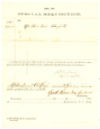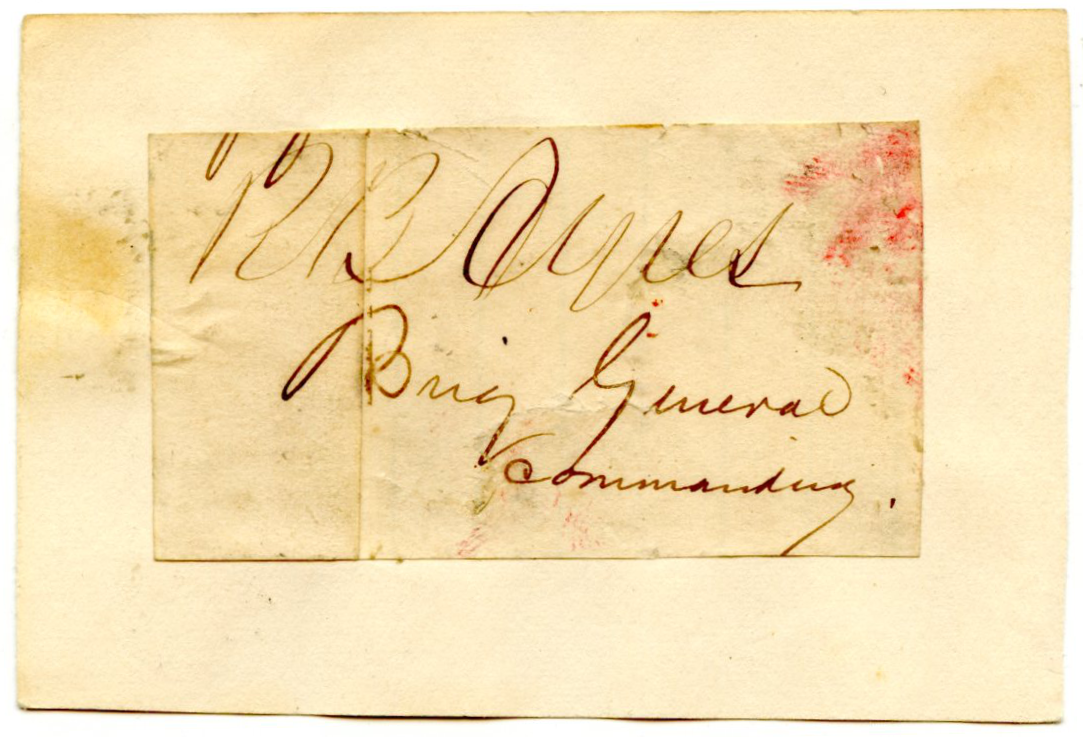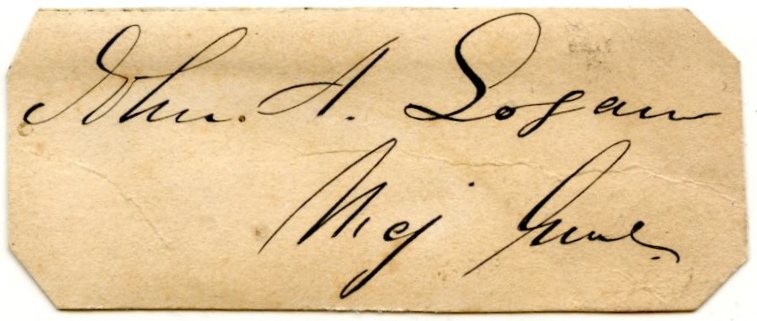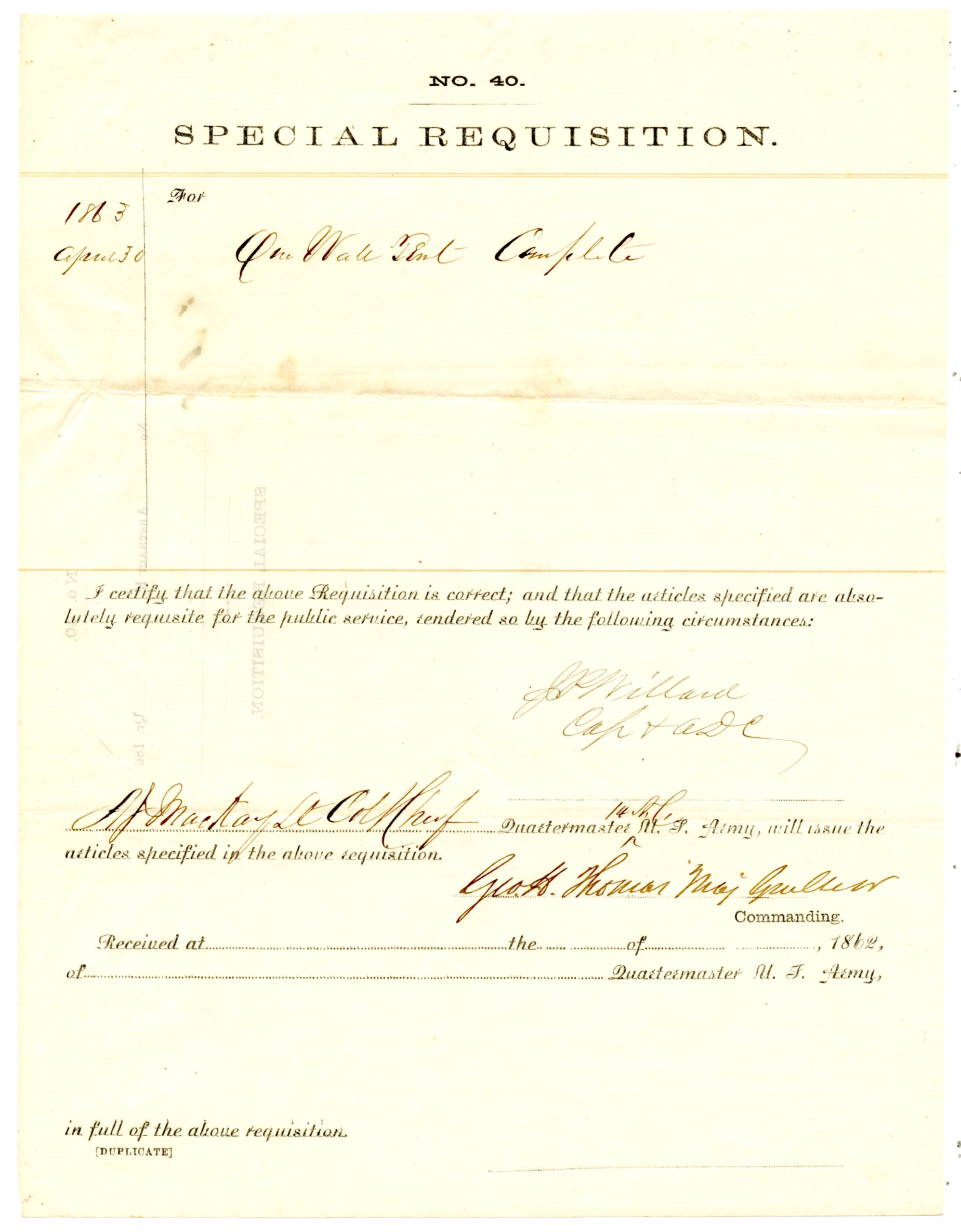New Items
These are our most recently listed items, in all categories.
 AYRES, ROMEYN BECK (1825-88) Union Brigadier General; Veteran of the Mexican War
AYRES, ROMEYN BECK (1825-88) Union Brigadier General; Veteran of the Mexican War

Signature, with rank in another hand, possibly war-date, “R.B. Ayres, Brig[adier] General Commanding,” on a 1 ½” x 2 ½” portion of a larger document; affixed to larger backing.
Moderate staining throughout, with a vertical crease at left center.
 BLAIR, FRANCIS PRESTON, JR. (1821-75) Union Major General; U.S. Senator – Missouri – 1871-73; U.S. Representative – Missouri – 1857-64; Democratic Candidate for U.S. Vice President on the Horatio Seymour Ticket - 1868
BLAIR, FRANCIS PRESTON, JR. (1821-75) Union Major General; U.S. Senator – Missouri – 1871-73; U.S. Representative – Missouri – 1857-64; Democratic Candidate for U.S. Vice President on the Horatio Seymour Ticket - 1868

Civil War-Date Autograph Letter Signed
Autograph Letter Signed, 8” x 10”, as U.S. Representative from Missouri, detailing the specifics of a land purchase.
“Wash[ington]
Mrs. Carroll,
D[ea]r Madam,
Mr. Bonifant sold me a small portion of the land he bought of you to straighten the line as he desired at $100 per acre before I consented to buy the part I bought. I do not know how much but Mrs. [?] does – these few acres being paid for by Bonifant at $100 per acre come to me at that price from him as by agreement, but is to be included in your deed to me. The three hundred dollars withheld, is to cover the difference in price between the few acres bought of Bonifant & the main body I bought of you. The $300 will cover that am[oun]t as well as the Supposed deficit in am[oun]t of land surveyed & off[ered] to me.
Y[ours] ob[edientl]y,
F.P. Blair
19 February [18]64].
Lightly and evenly toned, with a few minor stains, the expected folds, and a small area of paper loss in the upper left corner.
 LAW, EVANDER McIVER (1836-1920) Confederate Major General – Alabama; Severely wounded at First Bull Run, subsequently served with distinction at Gettysburg and Chickamauga
LAW, EVANDER McIVER (1836-1920) Confederate Major General – Alabama; Severely wounded at First Bull Run, subsequently served with distinction at Gettysburg and Chickamauga
-100.png)
Autograph Document Signed, 5 ¾” x 7 ¾”, Law’s handwritten requisition, rations for the officers and state troops under his command at Pensacola, Florida, many undoubtedly soon to be mustered into the 4th Alabama Infantry in the service of the Confederacy.
"Barrancas Barrack [Florida], Feb[ruary] 15, 1861… E.M. Law, Capt[ai]n, A[labama] Z[ouaves].”
Several ink stains throughout, with a pinhole at the upper edge; irregularly torn lower edge; horizontal fold at center.
 LOGAN, JOHN ALEXANDER (1826-86) Union Major General; U.S. Senator & Congressman – Illinois; Credited with the founding of Memorial Day; Veteran of the Mexican War
LOGAN, JOHN ALEXANDER (1826-86) Union Major General; U.S. Senator & Congressman – Illinois; Credited with the founding of Memorial Day; Veteran of the Mexican War

Signature & Rank, “John A. Logan, Maj[or] Gen[era]l,” on a 1” x 2 ½” slip of paper. Affixed to backing from a period newspaper.
Evenly toned, with minor staining; diagonally clipped at the corners.
 SMITH, CALEB BLOOD (1808-64) U.S. Interior Secretary – 1861-63 – Appointed by President Abraham Lincoln; U.S. Representative – Indiana - 1843-49
SMITH, CALEB BLOOD (1808-64) U.S. Interior Secretary – 1861-63 – Appointed by President Abraham Lincoln; U.S. Representative – Indiana - 1843-49

Civil War-Date Letter Signed – a resident seeks a pass to visit family in the Confederate town just two weeks before the Battle of Fredericksburg, Virginia – December 11-15, 1862
Letter Signed, 7 ¾” x 9 ¾”, as Civil War Interior Secretary in the cabinet of Abraham Lincoln. Addressing army Commander-in-Chief Henry Wager Halleck, Smith seeks a pass for “a loyal man” of the town shortly before the pivotal Civil War battle of Fredericksburg, Virginia.
“Dep[artmen]t of the Interior
Wash[ington], Nov[ember] 24, 1862
Sir,
The Bearer Mr. C.B. Cole of Fredericksburg Vir[ginia] desires to visit his family who are residing there. He is a loyal man of that State and you will gratify me very much if you will furnish him with the proper pass.
Very Respectfully,
Your obedient Servant,
Caleb B. Smith
Maj[or] Gen[era]l Halleck
Commander in Chief, & c.”
Excellent, with light, even toning and two horizontal folds.
 THOMAS, GEORGE HENRY (1816-70) Union Major General during the American Civil War, known as the “Rock of Chickamauga”; Veteran of the Mexican War
THOMAS, GEORGE HENRY (1816-70) Union Major General during the American Civil War, known as the “Rock of Chickamauga”; Veteran of the Mexican War

Civil War-Date Document Signed
THOMAS, GEORGE HENRY (1816-70) Union Major General during the American Civil War, known as the “Rock of Chickamauga”; Veteran of the Mexican War
MACKAY, ANDREW JACKSON (1827-1901) Union Brevet Brigadier General; Chief Quartermaster of the Army of the Cumberland
Document Signed, 7 ¾” x 10”, partly printed, April 30, 1863, “Geo[rge] H. Thomas, Maj[or] Gen[era]l U[nited] S[tates] V[olunteers], a requisition for “One Wall Tent Complete.” Countersigned by Chief Quartermaster General Andrew J. Mackay, later brevetted brigadier general for Civil War service, and Captain John Payne Willard, formerly of early-war service in the 31st Wisconsin Infantry.
Lightly and evenly toned, with a few scattered stains and the expected horizontal folds.



-1995.png)


